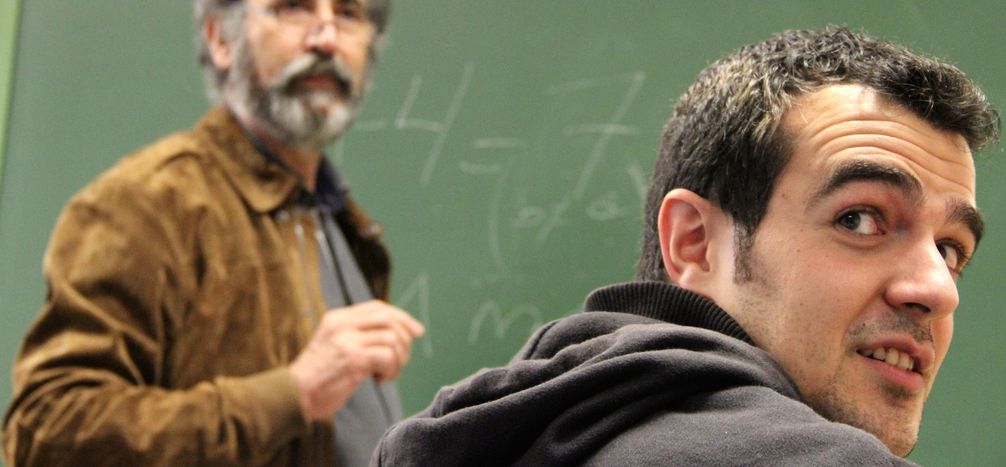
The fight to save German lessons in France
Published on
Translation by:
Sofia RabatéIn France, teachers, students, and representatives are laying into the new reform project led by the Ministry of National Education. For many, the ideas of the Ministry are destroying the learning of the German language. But for Amélie, who has been a high school teacher for 4 yeras, Goethe's language has been long suffering a worse injury: stereotypes.
cafébabel: We're having trouble understanding the writings of the high school reforms that threatens the teaching of German in France. As a teacher, can you tell us what is at stake?
Amélie: Until now, students have chosen a foreign language in their eighth year, and taken it three hours a week for two years. The project aims to start the learning of a foreign language starting in the seventh year, for two and a half hours a week. If this seem like progress, one shouldn't forget that it's difficult for a beginner to make progress in a foreign language with less than three hours weekly.
cafébabel: It's partly for this reason that these bilingual classes exist...
Amélie: The bilingual programs are a real success. Created ten years ago to revive the learning of German in secondary schools, they permit students to take time to consolidate what they learn. They even found an audience in low-income neighbourhoods. The creation of a bilingual class allowed for a standard of excellence to arise in establishments that are known as "difficult," making them more attractive. For certain parents of students in these high schools, enrolling their child in a bilingual class allowed them to be in a "good class." Certain students then "chose" German thanks to the bilingual system, when otherwise they would've most likely chosen Spanish as their foreign language... Bilingual classes have permitted German to remain the third most taught foreign language in France! For the language of our closest neighbour and our primary commercial partner, it's only the minimum! Many don't know that the most spoken language in Europe in terms of speakers is German (the official language of Germany, Austria, Switzerland, Belgium, Luxembourg, Liechtenstein, and it's even found in Northern Italy!) and that German is still largely taught in Eastern Europe, in the countries that have become new members of the EU!
cafébabel: Still, behind the will to "nurture linguistic diversity," the government disregards these bilingual classes, which are accused of elitism. Why?
Amélie: For many — including the Ministry of National Education, German is a language only for the best of students, who are capable of digesting declensions and irregular verbs... Certain parents hesitate to enroll their child in a bilingual class, fearing an excessive workload and long hours at school. There aren't any criteria for enrollment, and the selection is made "naturally" based on the previous year's results. But the bilingual class remains open to all! A student that is "slow," or more resistant to a new language would then have every reason to choose this class, since time will be taken to re-explain things, in addition to more practice... The bilingual class is then anything but elitist, since it actually makes a language that isn't that difficult more accessible, but this requires a certain rigour — a very Germanic rigour! — at the beginning, one must proceed with logic and clarity.
cafébabel: In France, it's often said that German is annoying and complicated. How do we change those mentalities?
Amélie: German teachers fight daily to make their language more attractive, they promote it in primary schools, they promote it to seventh years, they scramble to organise student exchanges or educational trips to "reward" their students for having had the courage to choose German. To be able to take our students to Germany is one of the "pros," both a finality and a motivation, but with this reform, we won't have the time nor the possibility to do that...
cafébabel: Why?
Amélie: Because, behind this reform project, we sense a real refusal to save the German classes... Imagining that from one day to the next the amount of German teachers will rise is really closing your eyes to reality: German has been losing steam for years. What a lot of people don't know is that we have to fight daily against prejudice, and notions that German is "hard," that the German teacher has to explain Hitler and Nazism several times a year, that "Heil Hitler" is often chanted in front of the German classroom... Luckily, our German students themselves take up the challenge of learning the language, and spread the message themselves that German isn't difficult, that it's similar to English, that in German class we do this and that, and the singer whose song we studied is "so swag."
A petition started on March 21st has already received over 42,000 signatures.
Translated from L’allemand en France : Goethe de bois



